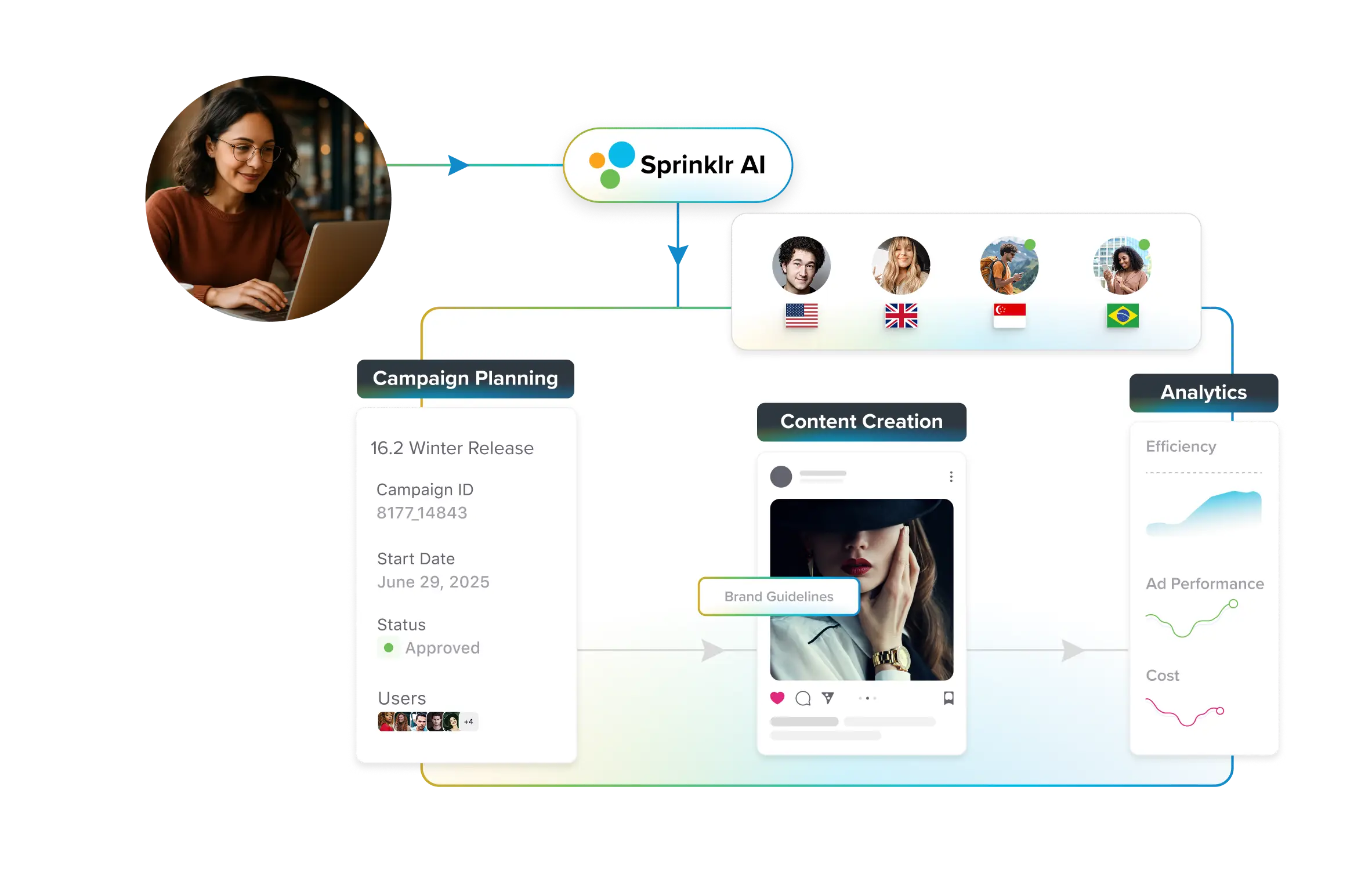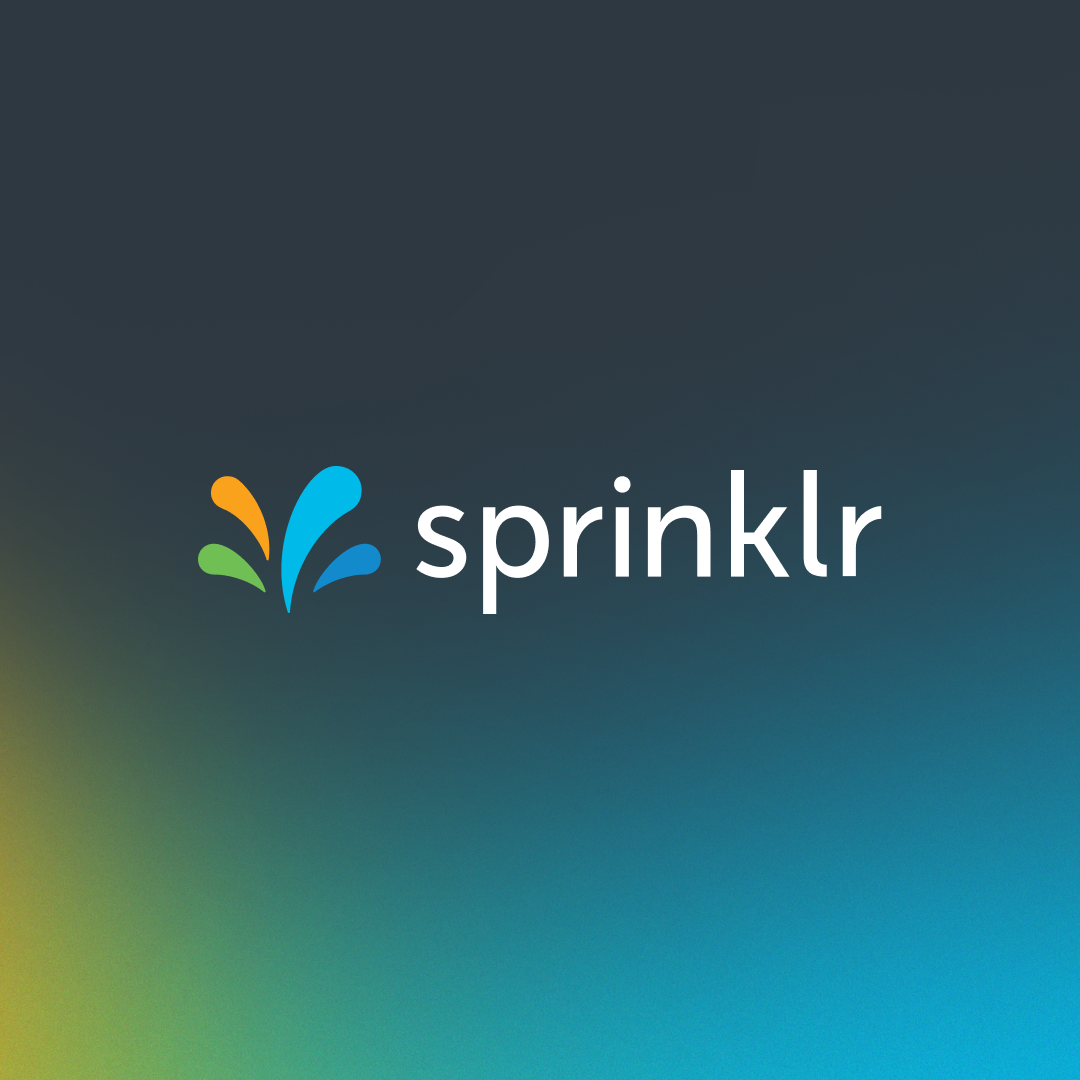The AI-native platform for global campaign management
Sprinklr Marketing unifies campaign planning, content creation, publishing and analytics across global teams — all elevated by AI. Accelerate go-to-market, boost performance and enforce brand governance at scale.

How to Create an Audience Profile
Picture this: You’re on a blind date at a restaurant and you’re tasked with ordering for both of you. You go all out — spicy tacos, sushi rolls, chocolate cake — hoping to impress. 😉
But your date is vegan, hates sushi and allergic to chocolate. Yikes!
“Without data, you’re just another person with an opinion.” — W. Edwards Deming. In the game of social media, opinions are like appetizers — everyone has one, but they don’t always satisfy.
Also, did you know that 57% of marketers admit to struggling with content creation because they don’t truly understand their audience? That’s just like the oops moment you just had with your date!
Creating an audience profile is your cheat sheet for your date’s preferences. It tells you if your followers crave TikTok trends or thoughtful TED talks. With this knowledge, you’ll stop guessing and start serving up content they’ll love.
Think of it as having the perfect plan for your date night. You’re not just guessing; you’re delivering exactly what they want. It’s a surefire strategy for success.
Ready to make every campaign, every interaction a success?
Let’s dive into the world of audience profiling and make sure every social media moment is a match made in heaven! ❤️
What is an audience profile?
An audience profile is a detailed description of a fictional character that represents a segment of your target audience for a specific marketing or advertising campaign.
Unlike a target market, which includes every potential buyer for your product or service, an audience profile focuses on one fictitious person who exemplifies the characteristics of a key segment of your target audience.
It helps you connect more effectively with that segment by focusing on four key components:
🎯 Segmentation: Breaking down your target market into specific, smaller groups.
📝 Messaging: Crafting the right messages for each group.
📱Engagement: Sharing those messages on the channels where your audience spends time.
🔍 Monitoring: Checking how well your campaigns are doing and making improvements.
For example, if you sell sports shoes, instead of targeting all athletes, you focus on "John," a 25-year-old runner who loves marathons, follows fitness influencers on Instagram and looks for shoes that offer extra cushioning. By understanding John's needs and preferences, you can create more personalized and impactful marketing campaigns that resonate with him and others like him.
Read More: Personalization is the Cornerstone of Effective Marketing and Here's Why
Importance of building an audience profile
Creating an audience profile isn't just about knowing your audience — it's about truly understanding them. This deep understanding can enhance almost every aspect of your business, from marketing to product development, customer service and more. Here’s why building an audience profile is essential:
- Personalized campaigns: Consumers today expect personalized experiences. With audience profiles, you can craft campaigns that deliver relevant content, offers and recommendations, making your marketing efforts more effective.

- Optimized strategies: Your marketing strategies should evolve with your audience's needs and preferences. Audience profiling helps you stay on target, ensuring you're reaching the right people at the right time through the right channels.
- Increased loyalty: By consistently creating targeted and relevant campaigns, you build trust and loyalty with your customers. They’ll know you understand their needs and will keep coming back.
- Competitive advantage: Knowing your customers better than your competitors gives you a significant edge. The fact that you tailor your products, services and marketing strategies to your audience’s needs Increases the possibility of you becoming their preferred brand. When you use a competitive benchmarking tool like Sprinklr, you can uncover detailed insights into your competitors’ audience profiles. By analyzing metrics such as average engagement levels, growth rates and top-performing content — you can see what works for your competitors and why.
This data-driven approach allows you to refine your own audience profiles and create content that resonates even more effectively with your target market.
- Higher return on investment: With a clear understanding of your audience, you can make more informed decisions, leading to higher social media ROI.
- Cost efficiency: Audience profiling helps you focus your efforts where they matter most, reducing wasted resources and making your campaigns more cost-effective.
- Risk reduction: With detailed audience insights, you’re less likely to make costly mistakes. You’ll know what resonates with your audience and can avoid strategies that don’t work.
Did you know?
Creating your own target audience profile packed with all of the advantages above is possible with a single advanced platform.
How, you ask?
It’s Sprinklr’s Audience Insights for you. It uses AI and trendspotting to help you unlock numerous benefits from one unified tool to create a precise target audience profile:
😊 Sentiment analysis: Understand the emotional tone behind interactions and mentions related to your brand. Use this insight to gauge public perception and incorporate these emotions into your audience profiles, ensuring your strategies align with their sentiments.
📊 Competitive benchmarking: Compare your performance with that of your competitors, identifying gaps and opportunities in your current approach.
👥 Audience analysis: Analyze social media interactions to build comprehensive profiles of your audience, including demographics, interests and behaviors. Tailor your content and campaigns to perfectly match your audience's preferences.

Sounds cool, right?
But wait, here’s the best part. You can get a quick demo of Sprinklr now and learn how to unravel your audience’s secrets 👇
Building an audience profile provides the information you need to make smart, data-driven decisions. It’s about moving from guessing to knowing, which increases your chances of success in all your business ventures.
Steps to make an audience profile
Creating an audience profile helps you tailor your marketing efforts to connect more effectively with your target audience.
Here’s an actionable step-by-step guide to help you create a comprehensive audience profile:
1. Define your target audience
Start by identifying the basic key data types for your target audience.
Gather information on the following:
Demographic data
📅 Age
🚻 Gender
🎓 Education
💼 Occupation
💵 Income level
👨👩👧👦 Family status
Geographic data
📍Location
Psychographic data
🎯 Interests
🎨 Hobbies
🌟 Lifestyle choices
Behavioral data
💻 Online activity
🛒 Purchase history
💬 Brand interactions
Let's say you're launching a new fitness tracker. Your target audience could be "Jane," a 28-year-old digital marketer living in a city, who loves yoga, follows fitness influencers on Instagram and is always looking for ways to integrate tech into her wellness routine.
2. Identify the pain points of your target audience
Perform market research to understand the challenges and pain points your audience faces. To gather insights, use:
- Surveys
- Interviews
- Social listening tools
The modern user tends to hop channels rapidly, leaving their digital footprint on the web, social media and traditional channels they frequent. Ensure you capture this footprint using an omnichannel listening tool like Sprinklr. Check out the length and breadth of our coverage here.
💡Pro Tip: An AI-driven audience insights platform like Sprinklr can transform how you approach your marketing strategies. Whether you’re a brand manager, creative manager or media manager, Sprinklr provides the advanced insights you need to:
- Understand audience affinities and identify key opinion leaders to boost brand awareness
- Find main story points in conversations to create content that resonates
- Discover top media channels to improve ROI
For example, Jane might find it hard to balance her work and workout schedule, often feeling demotivated by monotonous routines and overwhelmed by the abundance of fitness advice online.
3. Segment your audience
Start by segmenting your target audience into smaller groups based on shared characteristics. This helps you tailor your marketing strategies more effectively.
For example:
- Tech-savvy professionals: Individuals who are highly engaged with technology and prefer tech-integrated solutions.
- Busy parents: Parents who need quick and convenient solutions due to their tight schedules.
Having trouble segmenting your audience? Put AI to work 😉
To create audience segments that are smart and truly resonate, use an advanced feature like Sprinklr's Smart Segment.
It uses AI and ML to automatically create segments based on user behaviors and preferences. It analyzes patterns and data across various channels to identify groups with similar characteristics. This means you can target users with personalized content and offers that match their needs and preferences.
This smart approach helps you create detailed audience profiles, boosting engagement and conversions.
Start turning insights into action and see your audience profiling strategy thrive!
4. Create detailed personas
Once you've segmented your audience, create detailed personas for each segment. This step is crucial as it brings your audience to life and helps you understand their needs, preferences and behaviors. Jane could be one persona you built. Similarly, let’s take other segments and see how you can create detailed personas for each of them:
a. Give the persona a name and background story
Assign a name and create a brief background story to humanize the persona. This makes it easier for your team to relate to and understand the persona. For example:
- "Tech-savvy Tim": A 25-year-old software engineer who loves integrating fitness apps with his smart home devices.
- "Busy Brenda": A 30-year-old working mom who needs quick, effective workout routines.
b. Indicate the persona's demographic and psychographic traits
Detail the demographic (age, gender, occupation, education, income level, family status) and psychographic (interests, hobbies, lifestyle choices, values) traits. This information helps paint a comprehensive picture of the persona. Taking the same example:
- Tim: Male, 25, software engineer, bachelor's degree, single, high income, loves tech and fitness.
- Brenda: Female, 30, marketing manager, married with two kids, moderate income, values efficiency and family time.
c. Indicate pain points and challenges
Identify what issues or challenges the persona faces that your product or service can solve. This helps you understand their problems and how you can address them.
- For Tim it could be: Struggles with finding time for workouts, needs high-tech solutions to stay motivated.
- For Brenda it could be: Finds it hard to fit workouts into a busy schedule, needs quick and effective exercise routines.
d. Indicate needs and goals
Define what the persona needs and what they are trying to achieve. This aligns your product or service with their goals and aspirations.
- For Tim: Needs efficient, tech-integrated workout solutions to stay fit and save time.
- For Brenda: Needs workout routines that are quick, flexible and can be done at home.
e. Indicate preferred channels
Identify where this persona spends their time online and prefers to receive information. This helps you choose the right platforms for your marketing efforts.
- For Tim: Prefers using fitness apps, follows tech influencers on Instagram and reads tech blogs.
- For Brenda: Prefers Facebook groups for working moms, follows fitness influencers on YouTube and subscribes to family lifestyle blogs.
f. Create a visual representation of the persona
Develop a visual representation (like an infographic) to make the persona more relatable and easier to understand. Visuals can help your team quickly grasp the key aspects of the persona. For example, you could create a profile card with a photo, name, demographic details, interests and key traits for Tim and Brenda.
Take a look at the visual representation for Tim’s persona👇
g. Develop a day-in-the-life scenario for each persona
Describe a typical day in the life of the persona to understand their routine and how your product fits into it. This helps you see things from their perspective and identify touchpoints where you can engage them.
For Tim:
🌅 Morning: Uses a fitness app for a quick workout before work.
🍽️ Afternoon: Reads tech blogs during lunch break.
🌃 Evening: Uses smart home devices to track fitness progress and unwind.
For Brenda:
🌅 Morning: Quick home workout before the kids wake up.
🍽️ Afternoon: Checks Facebook groups for new workout tips during lunch break.
🌃 Evening: Follows a YouTube fitness routine after putting the kids to bed.
By following these steps, you can create detailed and effective personas for each segment of your audience. This will help you tailor your marketing efforts to meet their specific needs and preferences, making your campaigns more successful and engaging.
Also Read: How to Build a Social Media Persona for Your Brand
5. Validate personas and segments
After creating detailed personas and segments, it’s crucial to validate them with real customer data and feedback to ensure accuracy. This step helps you confirm that your audience profiles are on point and truly represent your target customers.
Analyze the data you've gathered to highlight the strengths and weaknesses of your current approach. Identify what resonates with your audience and what doesn’t. This involves looking at customer feedback, reviews and engagement metrics.
For instance, our Jane might love the advanced tracking features and personalized workout plans but find the user interface confusing or the app too cluttered.
💡 Quick Tip: Use real customer feedback to refine and adjust your personas and segments. This ensures your marketing efforts are always relevant and effective.
6. Engage with your audience on the right platforms
Identify where your audience spends their time online and engage with them on those platforms. If your audience is active on Instagram, TikTok and YouTube, focus your marketing efforts there.
For Jane:
- Create engaging Instagram posts with yoga tips
- Partner with fitness influencers for TikTok challenges
- Upload detailed workout routines on YouTube
Host live sessions on Instagram where Jane can interact with fitness experts and get her questions answered in real time.
Must-read:
- Instagram Marketing Guide
- Your Ultimate Guide to TikTok Marketing
- Twitter Advertising Strategies
7. Monitor your performance
Regularly review the performance of your campaigns to see how well they resonate with your audience.
✅ Use social media analytics tools to track engagement, conversions and feedback
✅ Look for patterns and trends that can help you understand what works and what doesn’t
For example, monitor which types of posts get the most interaction from Jane. Perhaps short, motivational videos perform better than long blog posts. Use tools like Google Analytics, Instagram Insights and TikTok Analytics to gather data.
Deep Dive: Social Media Insights: How to drive value from Social Data
8. Refine and update your audience profile
Based on your performance data, continuously refine and update your audience profiles. This ensures that your marketing strategies evolve with your audience's changing needs and preferences.
For example, if you notice a growing interest in mental wellness and mindfulness, update Jane’s profile to reflect this trend. Adjust your content to include more mental health tips and mindfulness exercises, ensuring you stay relevant to Jane's evolving interests.
Oh, and look you have already created an audience profile for Jane! 👇
Simple, right?
By following these steps, you'll create a detailed and effective audience profile that helps you connect with your target audience on a deeper level, making your marketing efforts more successful and your campaigns more engaging.
Top tips for audience profiling
Audience profiling is key to creating marketing campaigns that hit the mark.
Here are five easy tips to help you build spot-on audience profiles:
Tip 1. Use a single source of data
Pick one reliable source for your consumer research that gives you the most relevant information. Sticking to one source helps you avoid confusion and ensures you're working with accurate data. You can also use a unified audience insights tool (Sprinklr Insights is one such) that collates data from different sources into one pane of glass, using AI to pinpoint common trends and behaviors displayed by your audience across channels.
Related Read: 7 Ways to Use Social Media for Market Research
Tip 2. Know what you’re looking for
Before you dive into data, know what you need. Having a clear social media goal will help you find useful insights without getting lost in too much information. Common goals include market research for campaign/product launch, content personalization and campaign performance improvement.
Tip 3. Split your segments to your objectives
Tailor your audience segments to match your goals. This keeps your focus sharp and your marketing efforts relevant.
Tip 4. Track the right footprints
Figure out where your target consumers spend their time and why they like those places. Use this information to understand the customer journey and improve their experience with your brand.
Tip 5. Find the hot buttons
Identify what makes your brand the best choice for your audience. Highlight these points in your marketing messages to grab their attention.
By following these tips, you'll create clear and effective audience profiles, making it easier to connect with your target audience and boost your marketing success.
Also Read: Why Audience Profiling Should Be a Key Part of Your Paid Media Strategy
Conclusion
Building audience profiles doesn't have to be a chore. With the right approach, it can be fun and incredibly rewarding. By understanding who your audience is, what they care about and where they spend their time — you can create campaigns that hit all the right notes.
Whether it's nailing down demographics or tracking your audience's online hangouts, each step brings you closer to marketing success.
Why guess when you can know? Sprinklr Insights makes it easy to gather the insights you need to build accurate audience profiles.
Ready to supercharge your marketing? Contact us for a free demo of Sprinklr today.










